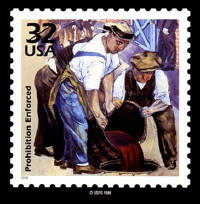It
was just like in the old movies. The speakeasy had a small peephole in the door. A guard
would look out the peephole and you would pass your card to him so he could see if it was
authentic, and then he would allow you to enter. I had a card issued to me because I was
previously admitted with a bonafide member of long standing.One night I treated my dad to this place. He was admitted as a
guest with my card, and he was amazed at what the speakeasy looked like inside. It had a
large bar with many people standing around. The interior was decorated very nicely, with
lots of tables and chairs, sort of like a nightclub. There were pictures on the wall of
famous singers and actresses.
My dad wanted to know how this whole place came about. I
explained that people selling alcohol were secreted from the police, even though there
were many city officials there. We had a couple of drinks and left. He was happy to see
it.
 The repeal of Prohibition in the early 1930's was a
godsend. FDR restored the making of beer as his first gesture on becoming president.
Legalizing the production of alcohol helped put thousands of people back to work. Many
breweries were reopened, which meant that many of the old-time brewers were coming back to
make beer, malt, and hops. It also created a market for kegs, delivery trucks, warehouses
for storing the liquor, and tavern's for selling it.
The repeal of Prohibition in the early 1930's was a
godsend. FDR restored the making of beer as his first gesture on becoming president.
Legalizing the production of alcohol helped put thousands of people back to work. Many
breweries were reopened, which meant that many of the old-time brewers were coming back to
make beer, malt, and hops. It also created a market for kegs, delivery trucks, warehouses
for storing the liquor, and tavern's for selling it.
The repeal of Prohibition helped the economy very much. It
stimulated the economy and improved the unemployment situation. Many people noticed the
difference. Formerly unemployed people were now working and spending money for long-needed
things, and enjoying life a lot more than before. All told, it was the best thing for
everyone.